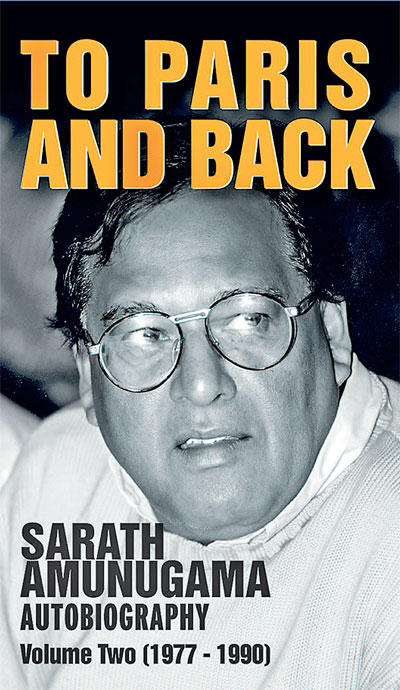Wednesday Feb 18, 2026
Wednesday Feb 18, 2026
Saturday, 3 September 2022 00:11 - - {{hitsCtrl.values.hits}}
 The vision, the resolve and the style of the political leadership determines the wellbeing of the people and defines the character of the state.
The vision, the resolve and the style of the political leadership determines the wellbeing of the people and defines the character of the state.
It is not often that a public intellectual who occupied a ring side seat at the circus gets to unravel the vision, evaluate the resolve, and contemplate the style of the Ring Master of the circus while also dissecting the others in the circus – the clowns, trapeze artists and acrobats.
The second volume of Sarath Amunugama’s autobiography is unquestionably an absorbing account of contemporary history. It is unputdownable but given the weight of 480 pages of an anecdotal odyssey, a regular pause at intervals is recommended.
The author’s perspectives are neither dispassionate nor moral neutral. They need to be absorbed at leisure. It is for the reader to assess his value judgements. Repeating them is not the burden of a review.
Intrigues, spin, and instances of back biting in the court of JRJ are recorded with a matter-of-fact neutrality.
That said, the value judgements made are sharp. They betray a penchant for puckish wit and clever banter. “The office of speaker carries great prestige but no tenders” is one such.
He had the good fortune to develop a close rapport with Esmond Wickremesinghe JRJ’s Cardinal Richelieu and Anandatissa de Alwis Sri Lanka’s pioneering and preeminent political marketer.
 “Thus, with my close relations with two of the country’s classic insiders – Esmond and Anandatissa de Alwis and with plenty of time for chats with both of them here and abroad, I became privy to the really real manner in which the modern Sri Lankan state was managed since independence by our leaders of different persuasions.”
“Thus, with my close relations with two of the country’s classic insiders – Esmond and Anandatissa de Alwis and with plenty of time for chats with both of them here and abroad, I became privy to the really real manner in which the modern Sri Lankan state was managed since independence by our leaders of different persuasions.”
The author describes his role undoubtedly pivotal, in introducing television to Sri Lanka that transformed mass media with touching candour and honest pride.
He identifies the accelerated Mahaweli scheme as one of the spectacular achievements of the Jayewardene regime.
The progress made in developing tourism during JRJ years is chronicled in meticulous detail.
Dealing with JRJ’s persona, the Social Scientist swings back and forth between Karl Schmidt and Antonio Gramsci!
Civility of the civil servant made him comply with JR’s hegemonic logic. Retrospective wisdom of the memoirist entertains serious doubts about the Nietzschean superman.
The author reconfirms JRJ’s oft expressed admiration and fascination with Napoleon. J.R. Jayewardene was a decisively cerebral admirer of Napoleon and an ardent adherent of Bonapartist governance and top-down reform.
Napoleon crowned himself in the Notre Dame Cathedral. JRJ did it on Galle Face Green, the exact venue where we recently witnessed a process – a kind of reverse process.
“I have been nourished by reflecting on liberty,” said Napoleon Bonaparte. “But I thrust it aside when it obstructed my path.”
In the second volume of his autobiography and memoirs Sarath Amunugama the social scientist and agile administrator but not quite the politician that he finally turned in to, provides an affectionate and acutely incisive study of the JRJ presidency.
It is essential reading for those who seek to make sense out of Sri Lanka’s current predicament. It is an eloquent excursion into our collective memory of the bamboozle that is called the executive presidential system.
To the concerned and caring citizen trapped in the current inflationary spiral reading it is catharsis.
It disassembles the uncle’s fantasy – of history remembering him as Aristotle’s notion of the philosopher king. It is also a good guide to comprehend the nephew’s ongoing march of folly.
Until the executive presidency, politics was a chaotic business. JRJ with his constitutional acrobatics made it a circus for ambitious clowns and a carnival for knaves.
As a site and a setting, Galle Face Green has an incestuous link with the executive presidency. On 4 February 1978 J.R. Jayewardene took his oath as Sri Lanka’s first Executive President in the locale where today dissenters have taken up kite flying.
Forty-four years ago, a multitude gathered at the Galle Face Green to watch JRJ assuming office as the Exceptive President – the highest authority – the supreme leader of the land.
In Volume Two of his autobiography covering years 1977-1990, social scientist and multi-talented mandarin, SA tells us how it all happened. In 1978 he was the Secretary of the Ministry of State. Image engineering of the regime was an assigned task. His Minister was the peppy persuader and spin master Anandatissa de Alwis.
“JRJ with his usual panache said that he wanted to take his oaths before a large gathering of the people. He proposed the Galle Face Green. Our Ministry proposed that the morning ceremony be followed by a mass musical show in the evening. That was a sure way of filling the grounds and G.V.P. Samarasinghe who chaired the preparatory meeting gave us his enthusiastic support. To improve on the shining hour, I asked the SLBC to get down the top popular singers of Hindi film songs for the musical show. This was not difficult because Hindi film makers depended on SLBC broadcasts on their Indian beam to popularize their products.
“We had a virtual monopoly of All India broadcasts. Consequently, we got down Mohamed Rafi, Mahendra Kapoor and Asha Bhosle. The show was announced by SLBC over the airwaves and from early morning crowds began to throng the green and JRJ’s dream of swearing in before a multitude of people was realized. He may have thought that they all came to cheer him. GVP was happy to receive accolades on our behalf for the stage arrangements. JRJ gifted the pen he used to sign the pledge to national archives.”
Sarath Amunugama occupied the vantage point of the insider and has the natural elan of the informed arbiter. His riveting narrative is an instructive excursion into years of JRJ’s rule – deprivation of civic rights of opponents, black July, the referendum, etc.
I cited this passage for a good reason. It demonstrates how the executive presidency – the whim of one man maneuverered our parliamentary democracy towards a labyrinthian descent into a dysfunctional and now a bankrupt republic.
How the Hindi singers Mohamed Rafi and Asha Bhosle appeased the ego of JRJ is no great puzzle.
In his treatise Manufacturing Consent Noam Chomsky explains what Sarath and Anandatissa did with Bollywood singers at the swearing-in of our first executive president.
“… massive propaganda is for everyone to consume. Consumption is good for profits and consumption is good for the political establishment.”
From then on spectacle mattered more and substance mattered less.
Sarath Amunugama the expert persuader tells us how the rice ration card – ‘Haal Potha’ of the closed economy was replaced with the ‘Salli Potha” the cash subsidy of the open economy.
Defining the persona of JRJ, the memoirist relies on Max Weber’s ‘rationalitat’ to explain JRJ’s cold logic that supposedly made him impervious to emotion.
Max Weber would have approved of JRJ. Weber presciently predicted the JRJ types while advising thin skinned academics to steer clear of politics.
“In a democracy the people choose a leader in whom they trust. Then the chosen leader says, ‘Now shut up and obey me.’ People and party are then no longer free to interfere in his business.”